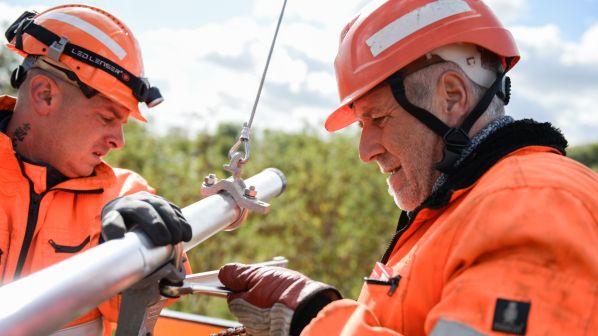German Rail (DB) expects around 55,000 employees to retire within the next decade, potentially taking with them valuable knowledge and expertise that they have developed over their time working within the company.
Much of the process-based knowledge can be written down and stored, so that the next generation can pick up the instructions, and continue to do the job of the person who has retired. But some of their knowledge is implicit and difficult to record step-by-step.
“You may know how to ride a bike, but try to write it down in detail so that anyone who doesn’t know how to can learn just from following your instructions,” challenged Ms Eva Kratzmeier, DB Training, Learning and Consulting. “It’s very difficult, and this is the knowledge that we want to focus on - the implicit knowledge of the employees. This knowledge is an important factor for production in the modern world of work. Many companies are successful because of the special expertise and knowledge of their employees. Especially in Germany, we create profit with our knowhow and innovations.”
To prevent the loss of this important knowledge, DB has developed a two-tier programme to pass on expertise from the retiree to the successor. First, the manager of the retiree analyses how much of the work is process based and easily transferable, and how many other employees within the company have similar knowledge.
“DB will train the facilitator to possess various tools and methods to help the retiree, along with current knowhow of different concepts and procedure”
If the manager decides that the knowledge is easily transferable and there is not a risk of losing valuable information, they then initiate the “basic” model, where the retiree sits down with the successor and, with the help of checklists and other documents developed by DB, outlines the information and knowledge they have.
If, however, the manager decides that the information is critical to the company, there are few other employees with similar knowledge and it is mostly non-process based, the manager initiates the “expert” model. This brings the manager and a facilitator into the process to work alongside the retiree and successor.
DB will train the facilitator to possess various tools and methods to help the retiree, along with current knowhow of different concepts and procedure, and will plan and coordinate the process of transferring the knowledge through a workshop.
The manager, who is responsible for the transfer of knowledge in their area, organises the process and helps gather the knowledge of the employee leaving, and, if there is no successor, takes on this role to gather the knowledge until the vacancy is filled.
Process
The process starts with a clarification meeting between the manager and employee, where they follow a guide which helps them to set goals and identify the knowledge, and decide the next steps using a transfer plan. They will also make a checklist of the various tasks undertaken by the departing employee, along with a list of people they contact, tools they use and other information they have.
If the manager decides there is a lot of implicit knowledge, he will then initiate follow-up workshops where the facilitator will take over and help the manager and the employee through the process to produce project profiles, where all important data is recorded and described.
Finally, all the necessary knowledge is presented in a structured way so the incoming employee can process, understand and incorporate it into their work.
“On the one hand it helps the leaving employee become aware of the knowledge they have, and on the other hand it helps the successor in his process of onboarding because he can see all the important knowledge,” Kratzmeier explains.
DB has also implemented inter-generational exchanges in an effort to pass on knowledge while also strengthening the company culture. As part of the six-month programmes, which are used for highly-specialised professions that require years of professional experience, older employees are paired with younger employees, who they work alongside to pass on their knowledge and expertise.

